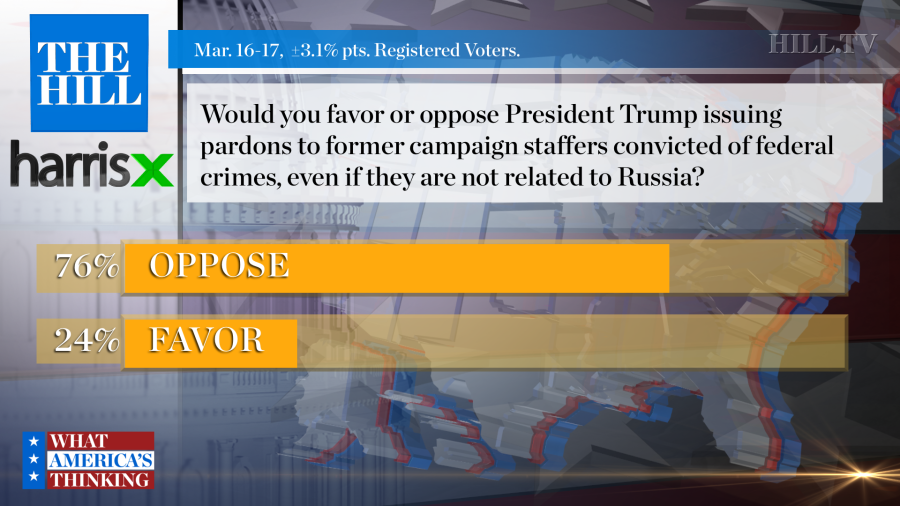A Hill-HarrisX poll released Tuesday shows overwhelming opposition to the idea of President Trump pardoning former aides who worked on his 2016 campaign.
Seventy-six percent of voters contacted for the March 16-17 survey said they opposed Trump extending executive pardons to his former political aides. Only 24 percent said they would approve of the pardons.
 Several former Trump aides, including his former personal attorney, Michael Cohen, and his one-time campaign chairman Paul Manafort, have either been convicted in court or pled guilty to a number of federal crimes.
Several former Trump aides, including his former personal attorney, Michael Cohen, and his one-time campaign chairman Paul Manafort, have either been convicted in court or pled guilty to a number of federal crimes.
While Trump has not announced any pardons for his one-time staffers, several of them have raised the topic, his personal attorney, Rudy Giuliani, told Hill.TV earlier this month.
Attorneys for Cohen have said that he was interested in receiving pardon, but is not any more. He is set to serve a 3-year sentence beginning May 6.
All demographic segments of the public were opposed to the idea of Trump pardoning his former associates. Even Republicans were against it, 63 to 37 percent. Independents strongly rejected the idea, 76 to 24 percent. Democrats were even more opposed, 87 to 13 percent.
“Pardons have never been popular,” Karlyn Bowman, a senior fellow at the American Enterprise Institute said on Tuesday’s broadcast of “What America’s Thinking,” Hill.TV’s show about public opinion and polling. “You can go all the way back to Gerald Ford’s pardon of Richard Nixon. Now people changed their mind about that over time but initially it was very unpopular. Bill Clinton’s pardon of Marc Rich at the very end of his administration, not popular. Trump’s pardon of [Joe] Arpaio, not popular. Pardons are not popular.”
Public opinion on the idea of Trump pardoning his former associates has been stable in Hill-HarrisX polling. In a Dec. 15-16 survey, only 28 percent of registered voters said they approved of the idea of Trump granting executive clemency to people who were convicted by Department of Justice special counsel Robert Mueller.
The president has repeatedly emphasized his pardon power on Twitter and in news interviews. He also has argued that he could pardon himself if he wanted to.
“As has been stated by numerous legal scholars, I have the absolute right to PARDON myself, but why would I do that when I have done nothing wrong?” Trump wrote in a June 2018 Twitter post.
Congressional Democrats, however, have argued that the president would be obstructing justice if he were to pardon people who were under investigation. At least some Republicans appear to agree.
“As a former prosecutor I have a lot of faith in the justice system. I don’t think anyone should dangle a pardon which could undermine the process. Once time has gone by and the appeals have been exhausted and there seems to be an injustice, then [a pardon] could be considered,” former Rep. Tom Rooney (R-Fla.), told The Hill earlier this week.
“I don’t believe the president has any plans to pardon these individuals,” Rep. Chris Stewart (R-Utah) said. “The only people who suggest this are the president’s political detractors.”
—Matthew Sheffield
hilltv copyright
